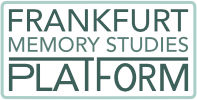Presentation: Living Together With Difficult Memories and Diverse Identities
Frankfurt, May 24, 2-4 pm, IG 1.414



Abstract:
The ERA.Net RUS Plus Project LIVINGMEMORIES (EU-FP7), a multi-disciplinary project analyses difficult memories and diverse identities related with conflicts and protest movements in Russia, Finland, Latvia, Estonia, Germany and Turkey. These countries share a complex history of World War I and II, civil wars, national awakenings, popular movements, and revolutions. In the aftermath of these events, government agencies, heritage professionals, communities and individuals seek to remember and commemorate or, conversely, to forget them. The past can affirm identities but it can also be potentially disruptive and regarded ‘difficult’. Based on a comparative approach, the project addresses vital questions every society faces after conflict: How can people live together after violent conflicts and with traumatic memories? How are myths, symbols and memories created and re-created? How is it possible to allow difficult and different memories instead of controlling or silencing them?
The Finnish research team at University of Helsinki concentrates on two case studies, which relate to the post WWII time in Finland and in Estonia. The first case study is oral history research on the internment of German and Hungarian citizens after the WWII in 1944–1946 in Finland and its aftermath. Research explores memories and experiences of individuals who were minor during the internment. It analyses issues relating to silence; the relationship between public memory and personal/private memory; and the reception of the law of compensation (in Finland 2014).The second case study of the Finnish team is related to queer sexualities in Soviet Estonia especially from the 1960s to the 1980s. Research analyses Estonian court cases and personal narratives of queer people. It explores how the Soviet system produced the homosexuality it sought to control and how is it possible to remember and commemorate something that was silenced in the past, especially when it is not openly discussed even now?
The German Team at Goethe University Frankfurt will focus on the memory of protest movements. It analyses memories of the ‘long 1960s’ protests in West and East-Germany. The project explores in particular how present day protests in Germany – both left and right-wing – relate to this contentious past. The aim is to assess the interplay between public memory of this contentious past on the one hand, and the memory work in contemporary movements on the other. Analyzing this interplay and comparing its dynamic in East and West Germany will provide crucial clues for understanding present day notions of citizenship and for grasping contemporary dynamics of political activism in Germany.
More information on http://dissidenz.net/en/projects/protest-and-memory/.


